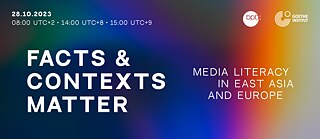Saturday, October 28th 2023
15:00–20:00 JST
Facts and Contexts Matter: Media Literacy in East Asia and Europe
Conference | Goethe-Institut Tokyo|Online conference on dealing with disinformation and hate speech
-
Online Online
- Language Conference Language: English, the conference will be translated simultaneously into Chinese, Japanese, and Korean.
- Price free of charge

Today more than 70 % percent of Korea’s and Taiwan’s population get their news online or via social media, whereas, in Japan and Germany, it’s slightly over 60 % with a gap between younger and older generations. While most of the content on their feeds may be correct, there is a higher exposure to misinformation and disinformation, especially during decisive events like elections, natural disasters, or times of crisis.
While the spread of misinformation and conspiracy theories have always been in the fabric of societies, the advent of the internet and the rise of social media have changed the dissemination of news and their consumption fundamentally. Today information can be spread decentralized with one click across various platforms at an enormous speed. Contents are often reduced to consumable and visual formats, with no additional background information – boosted by algorithms to reach a broader audience and consequently increase the revenue of important players in the information ecosystem like digital platforms.
Furthermore, with recent developments in AI technology and easy-to-use tools for media production and its dissemination the author or source of a post becomes often invisible to recipients and hence hard to verify. These shifts in communication and technology have deepened societal cleavages and polarization in many societies and even led to radicalization and violence. Although misleading and false narratives differ locally, many similar structural denominators like platform dynamics or the quality of mainstream media affect how content is spread and how societies and individuals deal with it.
To understand these dynamics better and discuss how interventions against misinformation and online hate speech are implemented the Goethe-Institut and the German Federal Agency for Civic Education (bpb) jointly organize the online conference “Facts and Contexts Matter: Media Literacy in East Asia and Europe” on October 28th, 2023. Experts from Korea, Japan, Taiwan, and Germany talk about how civil society, journalists, and regulators are dealing with this phenomenon in their regions and discuss their methods.
Practitioners in media literacy, civic education, journalism, governance, and science, as well as all interested people, are cordially invited to join.
Please confirm your participation via the registration form.
Program details:
While the spread of misinformation and conspiracy theories have always been in the fabric of societies, the advent of the internet and the rise of social media have changed the dissemination of news and their consumption fundamentally. Today information can be spread decentralized with one click across various platforms at an enormous speed. Contents are often reduced to consumable and visual formats, with no additional background information – boosted by algorithms to reach a broader audience and consequently increase the revenue of important players in the information ecosystem like digital platforms.
Furthermore, with recent developments in AI technology and easy-to-use tools for media production and its dissemination the author or source of a post becomes often invisible to recipients and hence hard to verify. These shifts in communication and technology have deepened societal cleavages and polarization in many societies and even led to radicalization and violence. Although misleading and false narratives differ locally, many similar structural denominators like platform dynamics or the quality of mainstream media affect how content is spread and how societies and individuals deal with it.
To understand these dynamics better and discuss how interventions against misinformation and online hate speech are implemented the Goethe-Institut and the German Federal Agency for Civic Education (bpb) jointly organize the online conference “Facts and Contexts Matter: Media Literacy in East Asia and Europe” on October 28th, 2023. Experts from Korea, Japan, Taiwan, and Germany talk about how civil society, journalists, and regulators are dealing with this phenomenon in their regions and discuss their methods.
Practitioners in media literacy, civic education, journalism, governance, and science, as well as all interested people, are cordially invited to join.
Please confirm your participation via the registration form.
Program details: